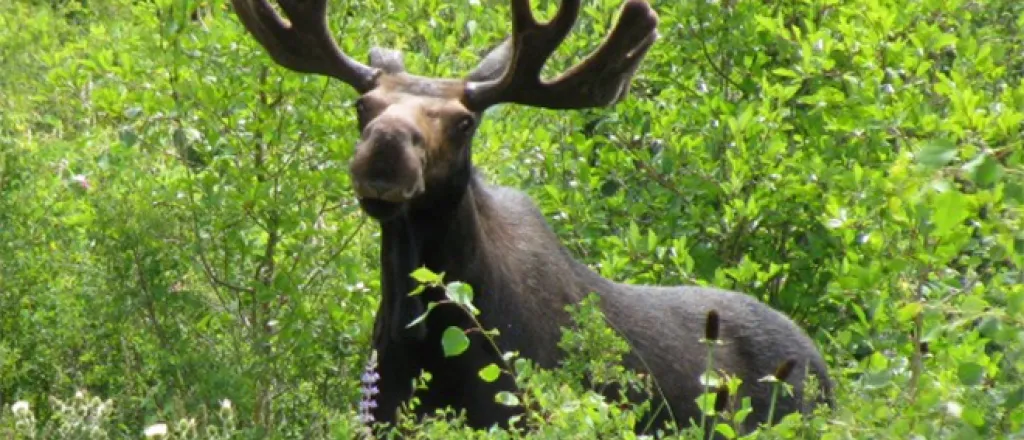
Kansan pleads guilty to poaching moose after public helps CPW track him down
After a near two-year investigation that included confronting a suspected poacher at his job in Kansas, Colorado Parks and Wildlife has secured a conviction in the case of a bull moose illegally killed in Teller County and left to rot.
The case ended July 10 when Steven Samuelson, 33, of Oakley, Kan., pleaded guilty in Teller County District Court to willful destruction of wildlife, a felony, as well as misdemeanor charges of hunting without a proper and valid big game license, aggravated illegal possession of wildlife, failure to prepare wildlife for human consumption, hunting in a careless manner and illegal take of wildlife.
Samuelson received a two year deferred jail sentence on the felony charge, meaning it will be waived if he meets the terms of the plea agreement, and two years unsupervised probation.
In addition, Samuelson was fined nearly $20,000 and surrendered the bow he used to poach the moose as well as other property that contained evidence of the crime including his cellphone. Samuelson also was assessed 65 points against his hunting license, with just 20 needed to suspend his hunting privileges.
The investigation began in September 2021 when CPW’s office in Colorado Springs received a report that someone had illegally shot a bull moose with an arrow in the woods north of Divide.
CPW Officers Aaron Berscheid, Travis Sauder and Ben Meier responded to the area to investigate and were led to the remains of the mature bull moose by the reporting parties.
The CPW team concluded a suspected poacher had shot the moose and then attempted to remove the head of the animal. Ultimately, the suspect laid tree branches and sticks across the carcass in an attempt to hide it.
Officers collected physical evidence from the site including photos and video from the reporting party’s game cameras which pinpointed the time of the incident and provided photos of the suspect.
“This moose was treated unethically and that is something we take very seriously,” said Sauder, assistant area wildlife manager for the Pikes Peak region. “We are fortunate members of the public share our passion for wildlife and helped us catch the poacher.
“We rely on honest sportspeople to help us solve these types of cases.”
Besides the public’s help, CPW used old-fashioned police work to track Samuelson down. The investigation reached a climax when Sauder and Meier drove to Kansas where they worked with members of the Kansas Department of Wildlife and Parks to confront Samuelson at work and execute a search warrant to gather valuable evidence at Samuelson’s Oakley home.
Kroening and Sauder praised the assistance their team received from the original reporting parties who hiked them to the moose, the Colorado Springs Police Department for helping access evidence on Samuelson's phone, and prosecutors with the Fourth Judicial District Attorney's office for moving the case forward and securing the plea agreement.
“Moose have become an iconic part of the Colorado landscape and have flourished since being reintroduced in 1978,” Kroening said. “The current population is estimated to be near 3,000 animals and they have spread throughout the state.
“While this creates many wonderful opportunities to photograph, view and hunt these animals, it has also created temptation among some to illegally poach these animals. The Samuelson case, and others, show CPW is determined to stop future poachers.”
Have information of a possible crime against wildlife? Call CPW, or report it anonymously to Operation Game Thief, or OGT. Reach OGT by calling, toll-free, 1-877-COLO-OGT (or 877-265-6648). Verizon users can dial #OGT. Or email CPW at game.thief@state.co.us.
A $500 reward is offered for information on cases involving big game or endangered species, while $250 is offered for information on turkey and $100 for fishing and small game cases.
A Citizens Committee administers the reward fund, which is maintained by private contributions. The board may approve rewards of up to $1,000 for flagrant cases. Rewards are paid for information that leads to an arrest or a citation being issued.
















